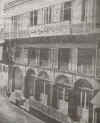|
|
|
||||
|
APRIL 2002 Contents
Travel 'Baikunth'
- the mountain Literature Visual Arts Jatin
Das - 4 decades of Music Zakir
Hussain - Compelling Hakim
Ajmal Khan's ancestral Business & Economy Performing Arts 'Fakir
of Benares' -1922 French Films Revathy
Menon's 'Mitr - my Books 'Knock
at Every Alien Door' People
Books
|
|
|
|||
| print gallery | |||||
|
Page 1 of 2
Sharif Manzil & Hindustani Dawakhana - crumbling memories of India's First Unani family by Sanjeeb Mukherjee
Amidst the narrow by-lanes of old Delhi, submerged in a sea of humanity are the ruins of the crumbling buildings which once went by the name of Sharif Manzil and Hindustani Dawakhana – the former a free hospital and the latter a dispensary. The dispensary took out patents for 84 rare herbal formulae. Some of these like Musafi, Sarbat-E-Sadar, Akise-Nisama, Sekhon and Hebab-Kebat—are still well known. Hakim Ajmal Khan was well-known for his secular views and also for his expertise in Unani medicine, a tradition which he inherited from his forefathers who were court physicians from the time of Mughal Emperor Babar. Ajmal Khan had the rare distinction of being the only Muslim leader to have been ever elected to a senior post in the Hindu Mahasabha. He was a Quranic scholar well versed in Arabic and Persian. In the labyrinth of congested bylanes of Old Delhi stand two of the most well known buildings of their time. The fame of these buildings went across the Indian borders. In the years preceding independence, people who regularly visited this place included Mahatma Gandhi, Pandit Jawaharlal Nehru, Maulana Azad, Vallabhbhai Patel, Lord Hastings and a host of other known politicial luminaries of that era. Today, amidst the narrow by-lanes of old Delhi, submerged in a sea of humanity are the ruins of the crumbling buildings which once went by the name of Hindustani Dawakhana and Sharif Manzil. Situated in Gali Qasimjan in the Ballimaran area of Chandni Chowk, the structures are a telling comment on the official apathy and neglect of heritage sites. The buildings that were once known for their unique fusion of Asiatic and Latin architecture are virtually on their last leg. Apart from the crumbling architectural beauty, it is the impressive past that is being lost - despite the fact that the Indian National Trust for Art and Cultural Heritage [INTACH] records these buildings as heritage sites. The past of the Hindustani Dawakhana and Sharif Manzil is the history of a family of practitioners of Unani school of medicine. The Dawakhana (or the Dispensary) was founded by the celebrated freedom fighter Hakim Ajmal Khan way back in 1912. The Sharif Manzil was set up by his grandfather Hakim Sharif Khan, as one of the finest hospitals that treated almost 500 people a day who came from all parts of India and some from neighbouring countries as well.
|
|||||
| Copyright © 2000 [the-south-asian.com]. Intellectual Property. All rights reserved. | |||||
| Home | |||||

